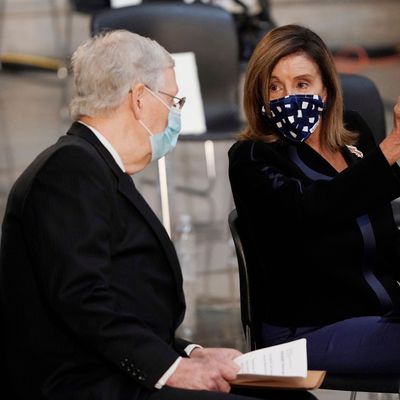
Nearly two and a half months ago, the House passed a Democratic proposal for the next coronavirus relief package, known as the Heroes Act. On Monday, Senate Republicans finally unveiled their own proposal, developed in conjunction with the White House, styled as the HEALS Act (Health, Economic Assistance, Liability Protection and Schools). It has not, to be clear, actually passed the Senate; without Democratic support, there are almost certainly enough Senate Republicans who oppose any new stimulus effort to prevent that from happening. HEALS is instead an opening bid in bipartisan and bicameral negotiations, which promise to be complex and difficult.
There are two areas of agreement at this point. First, authorization of a second set of direct payments to taxpayers, basically along the lines of those authorized in the CARES Act in March (the House version has higher payments for children). Second, at least a rhetorical sense of shared urgency over expiring CARES Act provisions, notably its $600 per week supplemental unemployment insurance funding, which runs out at the end of this week.
But the two parties are far apart on what exactly to do about unemployment insurance, with Democrats arguing the $600 payments should continue until the end of the year, while Republicans want to cut them to $200 per week for two months and then calibrate them to add up to 70 percent of lost wages (assuming the states can figure out how to do that). Meanwhile, Democrats are concerned about other expiring CARES Act provisions of less interest to Republicans, particularly an eviction moratorium on federally-assisted rental properties.
While Republicans have talked about addressing the CARES Act holdovers now and dealing with other issues later (presumably after the planned monthlong congressional recess in August), Democratic congressional leaders have so far rejected that idea on the grounds that it may delay a broader package indefinitely.
That’s where it all gets really complicated, since the two parties are on different planets when it comes to the broader issues. The differing sizes of the packages — the Heroes Act comes in at over $3 trillion, and the HEALS Act at around $1 trillion — is one indicator. The single biggest substantive difference is that the Heroes Act includes nearly a trillion dollars in general fiscal assistance for state and local governments, while the HEALS Act has zippo in new dollars for this purpose (though it does have language providing more flexibility in state use of CARES Act funding). A much smaller amount of money with big political implications is the Heroes Act’s $3.6 billion for election assistance, which collides with the Trump administration’s opposition to anything that might make voting by mail easier.
Both bills offer significant funds for education, but two thirds of the $70 billion the HEALS Act authorizes to K-12 schools is conditional on the schools physically reopening. The HEALS Act also cuts private schools into the money, while the Democratic bill offers $58 billion to public schools regardless of their reopening status.
In some areas (e.g., the small business oriented Paycheck Protection Act) the two bills mostly differ with regard to the amount of new money authorized, but there are plenty of sharp philosophical differences as well. Republicans are probably not going to be interested in Democratic efforts to suspend student loan payments and debt collections, and Democrats will exact a high price for accepting some version of the Republican demand for coronavirus liability protections for businesses.
As the negotiations lurch along, external developments could have an enormous influence. Most obviously, COVID-19 trends and their impacts on state and local public policies could increase or decrease the sense of urgency surrounding additional relief and stimulus measures, and the July Jobs Report expected on August 7 will help shape perceptions of where the economy stands. If the economy is clearly stalling again, Republicans looking down the barrel of big November election losses may be more willing to go along with more generous Democratic stimulus measures. Even now, as Politico Playbook observes, Democrats may have superior leverage:
THE GENERAL CONSENSUS of aides in both parties, on both ends of Pennsylvania Avenue, is that Democrats have a healthy negotiating edge.
REPUBLICAN senators have already conceded that half of their conference is going to be against this bill. Sen. TED CRUZ (R-Texas) helpfully reminded reporters that “there is significant resistance to yet another trillion dollars.” So to get anything done, Democrats will be absolutely crucial.
You can expect many twists and turns and a lot of posturing along the path to a deal, if one occurs, and Donald Trump can be expected to contribute a heaping helping of confusion and weirdness. The bipartisan consensus in Congress has finally buried Trump’s payroll tax cut pet rock for a while, but now he wants to include money for a new FBI headquarters building in downtown D.C., possibly because relocating it to the suburbs could make room for a competitor of his D.C. hotel to swoop in on the abandoned site.
In the Trump Era, there are no legislative givens.






























